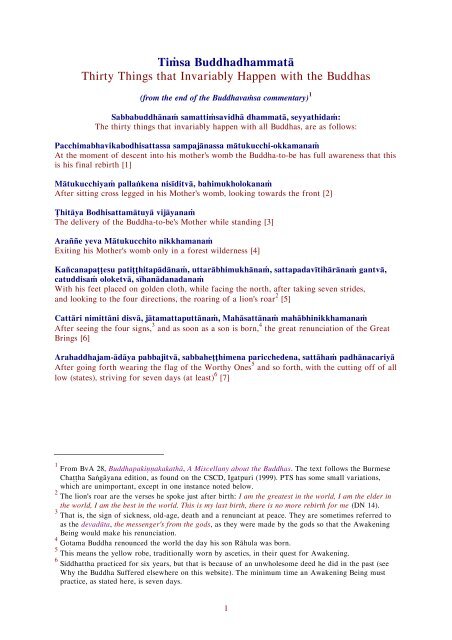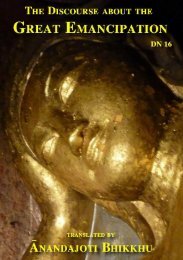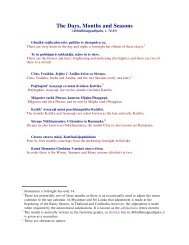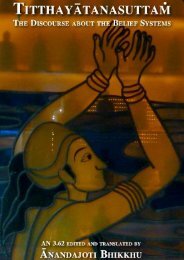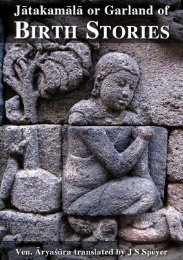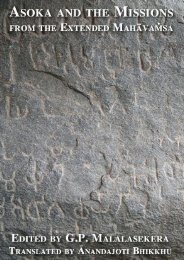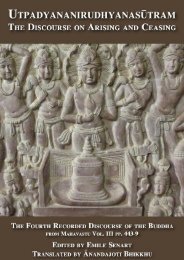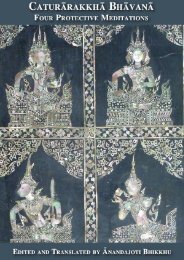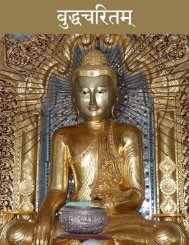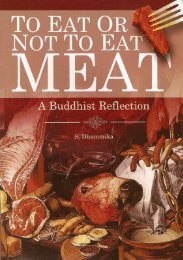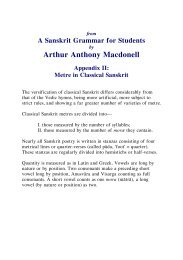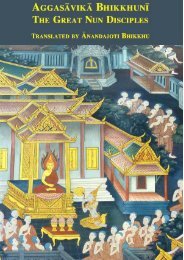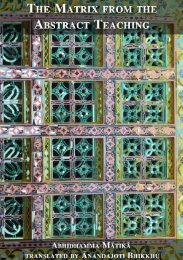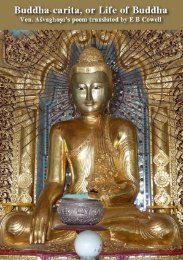PDF (4 pages, 140 KB) - Ancient Buddhist Texts
PDF (4 pages, 140 KB) - Ancient Buddhist Texts
PDF (4 pages, 140 KB) - Ancient Buddhist Texts
Create successful ePaper yourself
Turn your PDF publications into a flip-book with our unique Google optimized e-Paper software.
Tiṁsa BuddhadhammatāThirty Things that Invariably Happen with the Buddhas(from the end of the Buddhavaṁsa commentary) 1Sabbabuddhānaṁ samattiṁsavidhā dhammatā, seyyathidaṁ:The thirty things that invariably happen with all Buddhas, are as follows:Pacchimabhavikabodhisattassa sampajānassa mātukucchi-okkamanaṁAt the moment of descent into his mother's womb the Buddha-to-be has full awareness that thisis his final rebirth [1]Mātukucchiyaṁ pallaṅkena nisīditvā, bahimukholokanaṁAfter sitting cross legged in his Mother's womb, looking towards the front [2]Ṭhitāya Bodhisattamātuyā vijāyanaṁThe delivery of the Buddha-to-be's Mother while standing [3]Araññe yeva Mātukucchito nikkhamanaṁExiting his Mother's womb only in a forest wilderness [4]Kañcanapaṭṭesu patiṭṭhitapādānaṁ, uttarābhimukhānaṁ, sattapadavītihārānaṁ gantvā,catuddisaṁ oloketvā, sīhanādanadanaṁWith his feet placed on golden cloth, while facing the north, after taking seven strides,and looking to the four directions, the roaring of a lion's roar 2 [5]Cattāri nimittāni disvā, jātamattaputtānaṁ, Mahāsattānaṁ mahābhinikkhamanaṁAfter seeing the four signs, 3 and as soon as a son is born, 4 the great renunciation of the GreatBrings [6]Arahaddhajam-ādāya pabbajitvā, sabbaheṭṭhimena paricchedena, sattāhaṁ padhānacariyāAfter going forth wearing the flag of the Worthy Ones 5 and so forth, with the cutting off of alllow (states), striving for seven days (at least) 6 [7]1 From BvA 28, Buddhapakiṇṇakakathā, A Miscellany about the Buddhas. The text follows the BurmeseChaṭṭha Saṅgāyana edition, as found on the CSCD, Igatpuri (1999). PTS has some small variations,which are unimportant, except in one instance noted below.2 The lion's roar are the verses he spoke just after birth: I am the greatest in the world, I am the elder inthe world, I am the best in the world. This is my last birth, there is no more rebirth for me (DN 14).3 That is, the sign of sickness, old-age, death and a renunciant at peace. They are sometimes referred toas the devadūta, the messenger's from the gods, as they were made by the gods so that the AwakeningBeing would make his renunciation.4 Gotama Buddha renounced the world the day his son Rāhula was born.5 This means the yellow robe, traditionally worn by ascetics, in their quest for Awakening.6 Siddhattha practiced for six years, but that is because of an unwholesome deed he did in the past (seeWhy the Buddha Suffered elsewhere on this website). The minimum time an Awakening Being mustpractice, as stated here, is seven days.1
Tiṁsa BuddhadhammatāSambodhiṁ pāpuṇanadivase pāyāsabhojanaṁThe eating of milk-rice meal on the day he attains Complete Awakening 7 [8]Tiṇasanthāre nisīditvā sabbaññutañāṇādhigamoReaching omniscience 8 after sitting on a spread of grass, [9]ĀnāpānassatikammaṭṭhānaparikammaṁThe preparation of his meditation using the subject of in-breathing and out-breathing [10]MārabalaviddhaṁsanaṁThe crushing of Māra's army 9 [11]Bodhipallaṅke yeva tisso vijjā ādiṁ katvā, asādhāraṇañāṇādiguṇapaṭilābhoAfter gaining the three knowledges and so on while sitting cross-legged at the Bodhi (Tree),acquiring the virtue of the knowledges not shared (with others) 10 and so on [12]Sattasattāhaṁ Bodhisamīpe yeva vītināmanaṁSpending seven times seven days in the vicinity of the Bodhi Tree 11 [13]Mahābrahmuno Dhammadesanatthāya āyācanaṁThe request for him to preach the Dhamma being made by Mahā Brahmā 12 [14]Isipatane Migadāye DhammacakkappavattanaṁThe Rolling of the Dhamma-Wheel in the Deer Park at Isipatana 13 [15]Māghapuṇṇamāya caturaṅgikasannipāte PātimokkhuddesoThe recitation of the (Ovāda) Pātimokkha to the assembly endowed with four qualities 14 on thefull moon day of Māgha 15 [16]Jetavanaṭṭhāne nibaddhavāsoRegularly residing in Jeta's Wood 16 [17]7 The meal was given to Siddhattha by Sujāta, traditionally held to be the Mother of Yasa. She laterbecame one of his first lay women disciples (upāsikā), and along with Yasa's former wife, herdaughter-in-law, she was one of the first women to attain Stream-Entry.8 That is, attained Awakening; the grass was given to Siddhattha by Sotthiya.9 At the foot of the Bodhi Tree, following which he develops his concentration and insight.10 This goes further than simply attaining Awakening, and implies the six special knowledges availableonly to a Sammāsambuddha: knowledge of others' faculties, underlying tendencies, the double-miracle,the great compassion, omniscience and unobstructed knowledge (see Paṭisambhidāmagga 68 ff).11 Immediately after the Awakening. The Buddha spent seven days looking gratefully at the Bodhi Tree(this is known as the unblinking worship, animisapūjā), and seven weeks in the broad vicinity of theBodhi Tree, before walking to Isipatana, near Bārāṇasī.12 At the end of the seventh week.13 Taught to the five ascetics, and a large assembly of gods. This is the preaching of theDhammacakkapavattanasuttaṁ, the Discourse which set the Dhamma-Wheel Rolling, seventeenversions of which still survive.14 This was in the first year of the Awakening. The qualities are: they all had the same preceptor, theBuddha himself; they were all Worthy Ones (Arahanta); they arrived spontaneously at the gathering;and the Buddha gave the Ovādapātimokkha: Not doing any bad deeds, undertaking wholesome deeds,and purifying one's mind - this is the teaching of the Buddhas.15 Normally falling in January.16 The Buddha eventually made Sāvatthi, and particularly Jeta's Wood his base.2
Tiṁsa BuddhadhammatāSāvatthinagaradvāre yamakapāṭihāriyakaraṇaṁ,The performance of the twin miracle 17 at the gate of the city of Sāvatthi 18 [18]Tāvatiṁsabhavane AbhidhammadesanāThe preaching of the Abhidhamma in the Realm of the Thirty-Three 19 [19]Saṅkassanagaradvāre devalokato otaraṇaṁThe descent from the world of the gods 20 to the gate of city of Saṅkassa 21 [20]Satataṁ phalasamāpattisamāpajjanaṁThe entering into fruition-attainment 22 regularly [21]Dvīsu vāresu veneyyajanāvalokanaṁThe looking for the people who are capable of being led (to Awakening) on two occasions 23[22]Uppanne vatthumhi sikkhāpadapaññāpanaṁThe declaration of the precepts only when an occasion arises 24 [23]Uppannāya aṭṭhuppattiyā JātakakathanaṁThe narration of the Birth-Stories when an occasion for relating their meaning has arisen [24]Ñātisamāgame BuddhavaṁsakathanaṁThe narration of the Lineage of the Buddhas in an assembly of his relatives 25 [25]Āgantukehi bhikkhūhi paṭisanthārakaraṇaṁThe giving of a kind reception to incoming monks [26]Nimantitānaṁ Vuṭṭhavassānaṁ anāpucchā agamanaṁNot departing at the end of the Rains Retreat without asking those who invited him [27]Divase divase purebhattapacchābhattapaṭhamamajjhimapacchimayāmakiccakaraṇaṁDay by day performing his duties before the meal, after the meal, and in the first, middle andlast watch of the night [28]17 Performed to confute the heretics, it consisted of emitting fire and water from his body.18 Which was the capital of Kosala.19 Traditionally said to have been in the seventh Rains Retreat. Tāvatiṁsa is held to be two worldsabove our own.20 This means at the end of the Rains Retreat teaching the Abhidhamma.21 One of the more westerly cities in the Middle Country.22 This is the ability to produce the supermundane consciousness that arises when attaining awakening.23 In the PTS edition this reads: Dvīsu jhānesu, in two absorptions; if that reading is correct I do notunderstand the reference at all; if the adopted reading is correct, then it possibly means, the occasionafter Mahā Brahmā had requested him to teach, when he looked for someone to give the first teachingto; and in the mornings, when he would look around the world to see who could be brought toAwakening that day.24 That is, he doesn't produce a disciplinary code in the abstract, like a constitution, but throughprecedent, as in English common law.25 The book that this is a commentary on. This was directly after performing the double-miracle, and atthe urging of Ven. Sāriputta, at the head of five-hundred Worthy Ones.3
Tiṁsa BuddhadhammatāParinibbānadivase maṁsarasabhojanaṁThe eating of a meal consisting of flesh on the day he attains Final Emancipation [29]Catuvīsatikoṭisatasahassasamāpattiyo samāpajjitvā, parinibbānan-tiAfter attaining the twenty-four hundred thousand thousand million (2,400,000,000,000,000)attainments, the attainment of Final Emancipation [30]Imā samattiṁsa Sabbabuddhānaṁ dhammatā ti.Altogether these are the thirty things that invariably happen with all Buddhas.4


